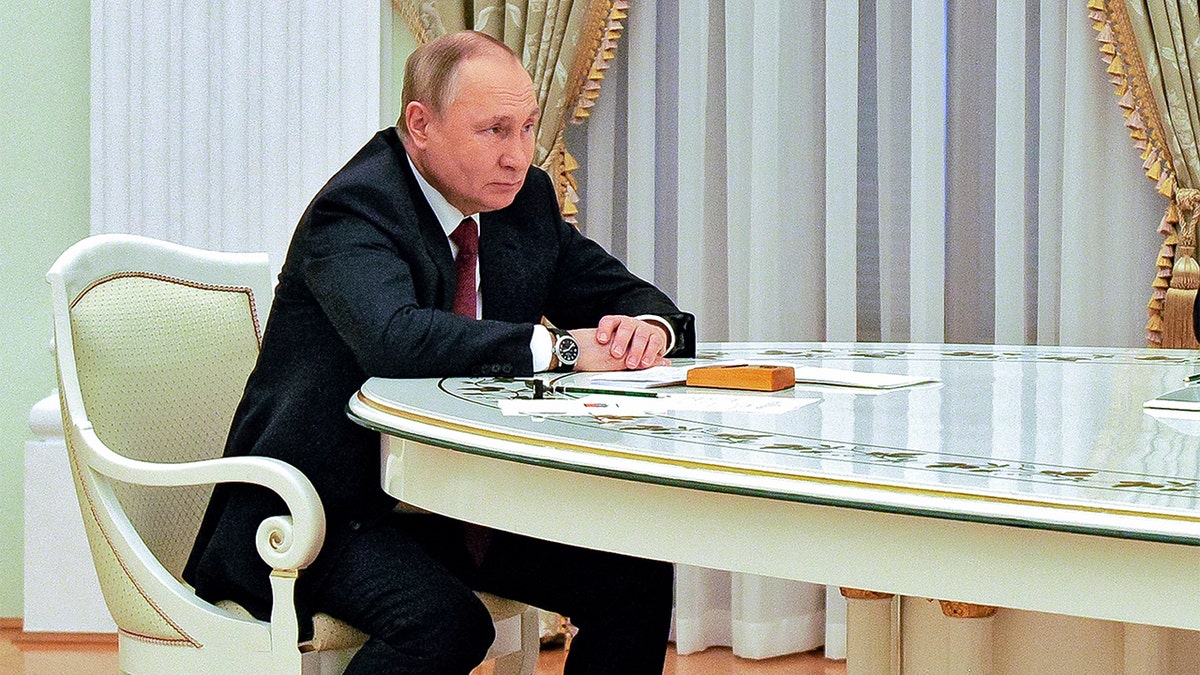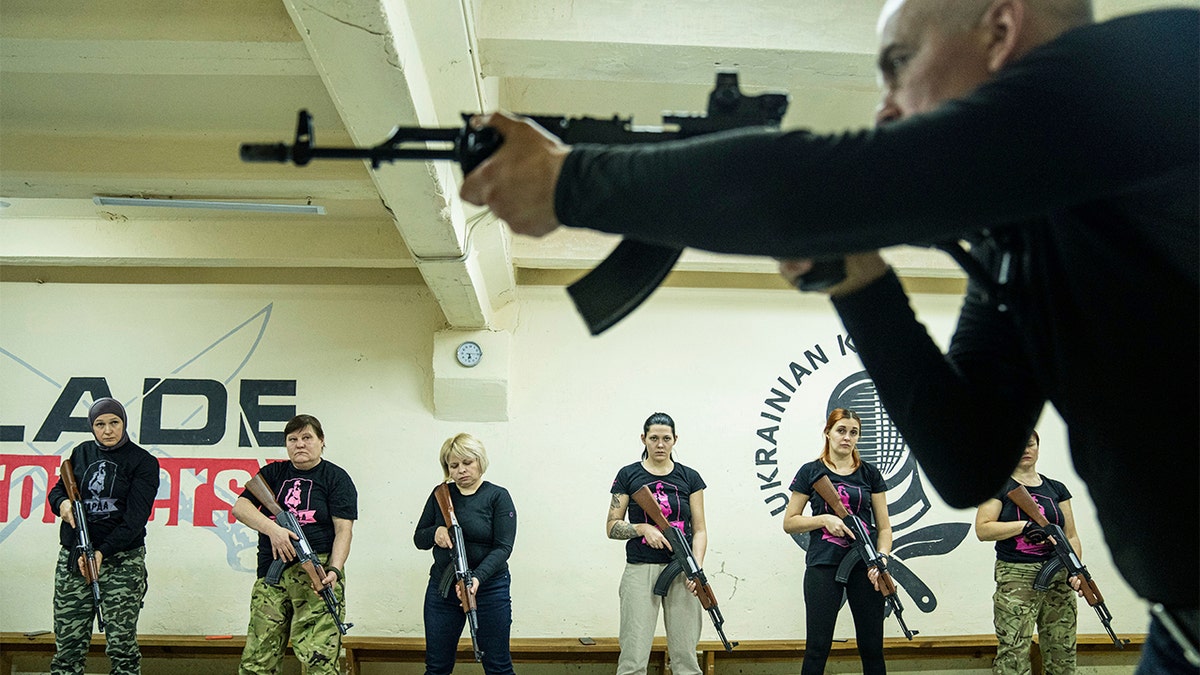US diplomat describes 'concerning' Russia-Ukraine tensions
Acting US ambassador to Ukraine speaks to Fox News
The Biden administration is working with Ukraine to "harden" its cyber defenses as it warns cyberattacks could be part of a "broad-based Russian effort" to "destabilize" and further invade the country, senior administration officials told Fox News.
As part of the effort, Anne Neuberger, the White House deputy national security adviser for cyber and emerging technology, is traveling to Europe Tuesday to engage with U.S. allies in an effort to elevate cybersecurity as a "top-tier priority" at NATO and with international partners.
Neuberger is set to travel to Brussels to meet with her EU counterparts and consult with NATO on ways to "enhance national and Alliance resilience in cyberspace, including deterring, disrupting, and responding to further Russian aggression against Ukraine, neighboring states, and in our respective countries," a senior administration official told Fox News in previewing her trip.
Neuberger is then set to travel to Warsaw to meet with Polish and Baltic cyber officials and is expected to hold virtual meetings with the Germans and the French.

Russian President Vladimir Putin listens to Hungary's Prime Minister Viktor Orban during their meeting in the Kremlin in Moscow, Russia, Tuesday, Feb. 1, 2022. (Mikhail Klimentyev, Sputnik, Kremlin Pool Photo via AP)
"Across all of these engagements, our focus is on ensuring that the United States and our allies and partners are prepared for any cyber-related contingency and prepared to respond in the current environment," an official said. "We will also discuss how we will coordinate and support Ukraine, and each other, in the event that cyberattacks occur."
Cybersecurity has been a key national security and economic security imperative for the Biden administration, officials said, adding that the administration is "prioritizing and elevating cybersecurity like never before."
Officials warned, amid the situation between Russia and Ukraine, that Moscow has used cyber as a "key component of their force projection" over the last decade.
With regard to security for Ukraine, officials said they have been "warning for weeks and months" that cyberattacks "could be part of a broad-based Russian effort to destabilize and further invade Ukraine."
"We have been working closely with Ukrainians to harden their defenses, and we will continue to do so in the days ahead," an official explained. "That being said, significant improvements in resilience don't happen in weeks, and we are realistic about what we can achieve, and also focused on ensuring we have incident response capacity available to them, if needed."
The Biden administration has been working with Ukraine to share information, build cybersecurity capacity and support Ukraine’s ability to respond to and recover from cyber incidents.
RUSSIA-UKRAINE: US SENDS ‘500 TONS OF DEFENSE EQUIPMENT’ TO KYIV: LIVE UPDATES
"We’ve also laid out a very clear message to the Russians in concert with our allies and partners," a senior administration official said. "If Russia seeks to destabilize and further invade Ukraine, we will respond."
Officials said that while there "are not currently any specific credible threats to the U.S. homeland," they are "mindful of the potential for Russia to consider escalating its destabilizing actions in ways that may impact others outside of Ukraine."

An instructor shows how to use weapons to a group of women during training in Kharkiv, Ukraine, Sunday, Jan. 30, 2022. Some people in Ukraine's second-largest city are preparing to fight back if Russia invades. Kharkiv is just 25 miles from some of the tens of thousands of Russian troops massed at the border. (AP Photo/Evgeniy Maloletka)
Neuberger’s travel comes just a day after President Biden threatened Russia with "swift and severe consequences" should Moscow choose to "walk away from diplomacy and attack Ukraine," maintaining that the United States and allies are continuing "to prepare for every scenario."
"The world must be clear-eyed about the actions Russia is threatening and ready to respond to the risks those actions present to all of us," he said, noting that Monday’s meeting of the U.N. Security Council is a "critical step in rallying the world to speak out in one voice: rejecting the use of force, calling for military deescalation, supporting diplomacy as the best path forward, and demanding accountability from every member state to refrain from military aggression against its neighbors."
The president’s statement was made public as the U.N. Security Council met for the first time to discuss the ongoing situation — as Russia has stationed an estimated 100,000 troops near Ukraine’s borders, stoking fears in the West of an invasion.
Also on Monday, White House press secretary Jen Psaki announced that the Biden administration has developed "specific sanctions packages" for Russian elites and their family members if Moscow invades Ukraine.
"The individuals we’ve identified are near the inner circle of the Kremlin and play a role in government decision-making or, at a minimum, are complicit in the Kremlin’s destabilizing behavior," Psaki explained, noting that "many of these invidious are particularly vulnerable targets because of their deep and financial ties with the West."
Psaki explained those individuals "would be hurt by sanctions that are tying them to Western financial systems."
The sanctions packages are "just one piece" of the Biden administration’s effort to "hit Russia from all angles," Psaki said.
Russia, though, has denied it intends to launch an attack. Russian officials said NATO must promise not to allow Ukraine to join the alliance, among other demands, which the United States and NATO have rejected.
Biden, during a call with Ukrainian President Volodymyr Zelenskyy last week, warned of a "distinct possibility" of a Russian invasion in February.
Zelenskyy, though, said Ukraine is "not seeing any escalation bigger than before," and said the Russian build-up of troops could be an attempt by Moscow to exert "psychological pressure" and sow panic.
Kremlin spokesman Dmitry Peskov said Monday that "hysteria promoted by Washington triggers hysteria in Ukraine, where people are almost starting to pack their bags for the front line."
Russia Ambassador Vasily Nebenzya on Monday slammed the West, claiming it is trying to will a Ukrainian war into existence.
"The deployment of Russian troops within our own territory has frequently occurred on varying scales before and has not caused any hysterics whatsoever," he said. "The discussions about a threat of war is provocative in it of itself."
Nebenzya added: "You are almost calling for this, you want it to happen, you are waiting for it to happen as if you want to make your words become a reality."
Nebenzya said Russia is "constantly rejecting these allegations and this is despite the fact that no threat of a planned invasion into Ukraine from the lips of any Russian politician or public figure over all this period has been made – no such threat has been made."
Last week, U.S. Defense Secretary Lloyd Austin put 8,500 U.S. troops on high alert for potential deployment to support and reassure NATO allies in Eastern Europe.
CLICK HERE TO GET THE FOX NEWS APP
But with regard to Nebenzya's comments, Psaki said the Biden administration's "view is that the door to diplomacy should always be open."
Secretary of State Antony Blinken is set to meet with Russian Foreign Minister Sergey Lavrov Tuesday, which Psaki said is the administration's "next step" in "diplomatic efforts and engagements."
"Regardless of what people's public rhetoric is, it's our view that the door to diplomacy should always be open," Psaki said. "And ultimately, the question here is about what President Putin is going to do."
Fox News' Greg Norman and The Associated Press contributed to this report.

















































